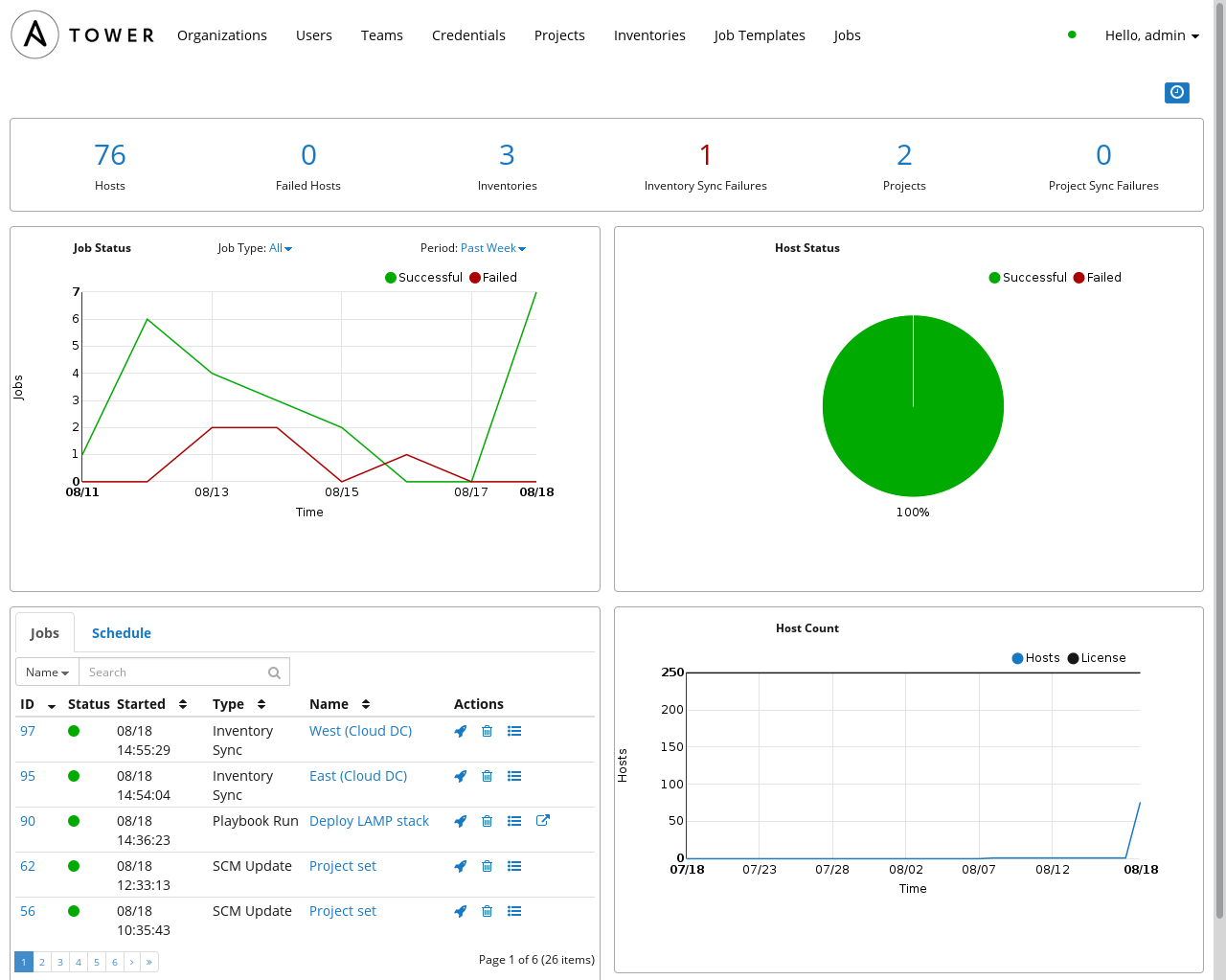
for DevOps
Machine provisioning and application deployment with ease.
ansible presentation 06/15 @ Web-Dev-BBQ #4 Stuttgart/Germany
Markus Wanjura
Head of IT & Development
@ develop4edu GmbH Stuttgart
XING: xing.to/wanjura GitHub: git.io/FGqg
Felix Peters
Application Developer
@ develop4edu GmbH Stuttgart
XING: xing.to/flxpeters GitHub: git.io/vIlcG
We are just looking for
frontend freelancers!
Apply now!
- What Is Ansible?
- The Basics
- Provisioning
- Application Deployment
- Tools & Hints
What's your poison?
Puppet, Chef, Salt, Cobbler, CFEngine, YADT, JuJu, BASH, Ant, Phing, Capistrano, Deployer, Drush, Surf, Docker, Rocket...?
Or all of them?
You think DevOps and the tools are complicated?
You hate it?
You're right!
Are you serious?
No DevOps for you?
You know YAML?
A bit of BASH?
Damn!
You are a freaking awesome DevOps pro!!!
So what is ansible?
So what is ansible?
- An open-source software for configuring and managing computers.
- Founded by Michael DeHaan
- First release February 20, 2012 - 3 years ago
- Written in Python
- It runs over SSH or PowerShell
- It was named "ansible" after the fictional instantaneous hyperspace communication system featured in Orson Scott Card's "Ender's Game"
Michael DeHaan's motivation?
"I wrote ansible because none of the existing tools fit my brain.
I wanted a tool that I could not use for 6 months, come back later, and still remember how it worked."
Design goals
Minimal in nature
Secure
Only OpenSSH is required.
Highly reliable
Low learning curve
Ok let's have some fun!
Ansible Basics
... is worth a thousand words.
A basic playbook.
Installs an Apache, configures and restarts it. On 1 or 1000 Servers...
- hosts: webservers
vars:
http_port: 80
tasks:
- name: ensure apache is at the latest version
yum: pkg=httpd state=latest
- name: write the apache config file
template: src=/srv/httpd.j2 dest=/etc/httpd.conf
- name: ensure apache is running (and enable it at boot)
service: name=httpd state=started enabled=yesBut let's start step by step
Install ansible
Python only
$ sudo pip install ansibleOn CentOS with EPEL repo enabled
$ sudo yum -y install ansibleOn Debian or Ubuntu with ansible ppa
$ sudo apt-get install -y ansibleInventories
./inventories/myclusterContent of the inventory file
[mycluster]
node-01.internal.acme.com
node-02.internal.acme.com
[webservers]
node-[01:1000].internal.acme.com
[databases]
db-[a:f].internal.acme.com
[myspecialpony]
pony ansible_ssh_host=192.168.1.50 ansible_ssh_user=vagrant
Ad-Hoc ansible commands
Basic ping
$ ansible -i inventories/mycluster webservers -m pingGet free memory
$ ansible -i inventories/mycluster databases -a 'free -m'Playbooks
./site.yml- hosts: webservers
vars:
http_port: 80
tasks:
- name: ensure apache is at the latest version
yum: pkg=httpd state=latest
- name: write the apache config file
template: src=/srv/httpd.j2 dest=/etc/httpd.conf
- name: ensure apache is running (and enable it at boot)
service: name=httpd state=started enabled=yesRoles
Installs an Apache and PHP
- hosts: webservers
vars:
http_port: 80
hostname: foobar.tld
max_allowed_memory: 128M
roles:
- { role: apache, tags: apache }
- { role: geerlingguy.php, tags: php }Your apache tasks are now located here
./roles/apache/tasks/main.ymlShared roles
- hosts: webservers
roles:
- { role: apache, tags: apache }
- { role: geerlingguy.php, tags: php }Install a shared role globally
$ ansible-galaxy install geerlingguy.php
- downloading role 'php', owned by geerlingguy
- downloading role from https://github.com/geerlingguy/ansible-role-php/archive/1.6.1.tar.gz
- extracting geerlingguy.php to /etc/ansible/roles/geerlingguy.phpShared roles
./ansible.cfg[defaults]
roles_path = ./vendor:./rolesInstall a shared role locally
$ ansible-galaxy install geerlingguy.php
- downloading role 'php', owned by geerlingguy
- downloading role from https://github.com/geerlingguy/ansible-role-php/archive/1.6.1.tar.gz
- extracting geerlingguy.php to ./vendor/geerlingguy.php
Variables
The vars_files
- hosts: webservers
vars_files:
- vars/main.yml
roles:
- { role: apache, tags: apache }
- { role: geerlingguy.php, tags: php }Your vars are now located here
./roles/apache/vars/main.ymlFolder structure
├── ansible.cfg
├── site.yml
├── host_vars
│ └── myspecialpony.local
├── group_vars
│ └── webservers
├── inventories
│ ├── mycluster
├── roles
│ └── apache
│ ├── tasks
│ │ └── main.yml
│ └── vars
│ └── main.yml
├── vendor
│ └── geerlingguy.php
└── vars
└── main.ymlTemplates
Jinja2 python template engine (Symfony/Twig originates from jinja)
├── site.yml
├── roles
│ └── apache
│ ├── tasks
│ ├── ...
│ └── templates
│ └── httpd.j2- name: write the apache config file
template: src=/srv/httpd.j2 dest=/etc/httpd.conf...
# prevent Apache from glomming onto all bound IP addresses.
Listen {{ http_port }}
...Templates
A more advanced example
################################################
# {{ ansible_managed }}
################################################
[Global]
hostname = {{ netatalk.hostname }}
login message = "{{ netatalk.welcome_message }}"
mimic model = {{ netatalk.icon }}
zeroconf = yes
uam list = uams_guest.so
guest account = {{ netatalk.user }}
log level = default:debug
{% for item in netatalk.shares %}
[{{ item.name }}]
path = {{ netatalk.rootpath }}{{ item.name }}
valid users = {{ netatalk.user }}
{% endfor %}Provisioning
A complete LAMP stack on CentOS 7.1
- hosts: all
sudo: true
vars_files:
- vars/main.yml
pre_tasks:
- selinux: state=disabled # only for demo
- service: name=firewalld state=stopped # only for demo
post_tasks:
- file: path=/etc/httpd/conf.d/welcome.conf state=absent
- service: name=httpd enabled=true state=reloaded
roles:
- { role: repo_epel, tags: repo_epel }
- { role: repo_remi, tags: repo_remi }
- { role: geerlingguy.ntp, tags: ntp }
- { role: common, tags: common }
- { role: mwanjura.mysql, tags: mysql }
- { role: geerlingguy.php, tags: php }
- { role: geerlingguy.apache, tags: apache }
- { role: geerlingguy.composer, tags: composer }Let's play
$ ansible-playbook site.yml -i inventories/myclusterApplication Deployment
Shared role "ansistrano"
Capistrano like application deployment
Works as a drop-in replacement for Capistrano or Deployer
https://github.com/ansistrano/deploy./deploy.ymlhosts: all
vars:
ansistrano_deploy_from: "./"
ansistrano_deploy_to: "/var/www/html"
ansistrano_after_symlink_tasks_file: "{{ playbook_dir }}/deploy/tasks/after-symlink.yml"
ansistrano_before_symlink_tasks_file: "{{ playbook_dir }}/deploy/tasks/before-symlink.yml"
roles:
- { role: carlosbuenosvinos.ansistrano-deploy }Structure within your project
├── README.md
├── app
├── composer.json
├── composer.lock
├── src
├── web
├── inventories
│ ├── production
│ ├── development
│ └── staging
├── deploy
│ └── tasks
│ ├── after-symlink.yml
│ └── before-symlink.yml
├── deploy.yml
└── rollback.ymlStructure on your servers
├── current -> ./releases/20150608080601
├── releases
│ ├── 20150605152333
│ └── 20150608080601
│ ├── app
│ ├── src
│ ├── logs -> ../../shared/logs
│ └── ...
├── repo
│ ├── branches
│ ├── config
│ ├── ...
│ └── refs
├── shared
│ ├── vendor
│ ├── assets
│ └── logs
└── revisions.log"Hooks"
./deploy/tasks/before-symlink.yml- name: ensure cache dir
file: path={{ ansistrano_release_path.stdout }}/app/cache state=directory mode=0775 recurse=true
- name: ensure log dir
file: path={{ ansistrano_release_path.stdout }}/app/logs state=directory mode=0775 recurse=true./deploy/tasks/after-symlink.yml- name: Reload Apache
service: name=httpd state=reloadedLet's play
$ ansible-playbook deploy.yml -i inventories/productionTools & Hints
YAML Syntax
It's up to you
Short
- name: ensure cache dir
file: path={{ ansistrano_release_path.stdout }}/app/cache state=directory mode=0775 recurse=trueCorrect
- name: ensure cache dir
file:
path: "{{ ansistrano_release_path.stdout }}/app/cache"
state: directory
mode: 0775
recurse: trueDocumentation
http://docs.ansible.com
Ansible Galaxy
https://galaxy.ansible.com/
Ansible Galaxy
Remember?
Install a shared role
$ ansible-galaxy install geerlingguy.phpAnsible Tower
http://www.ansible.com/tower
Book "ansible for DevOps" by Jeff Geerling
https://leanpub.com/ansible-for-devops